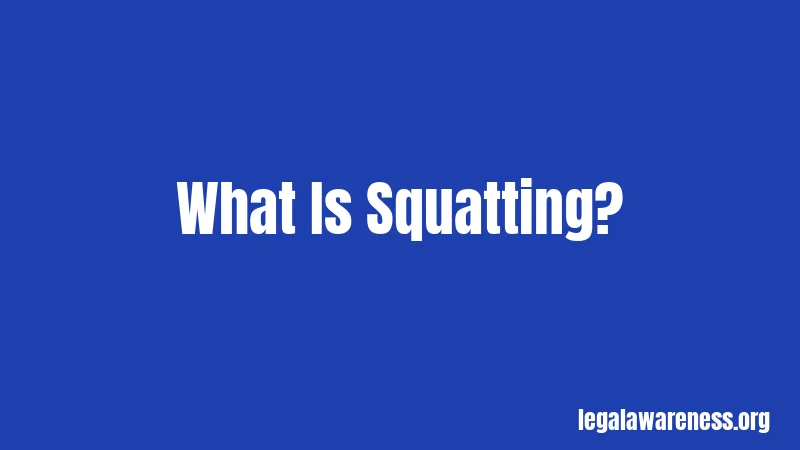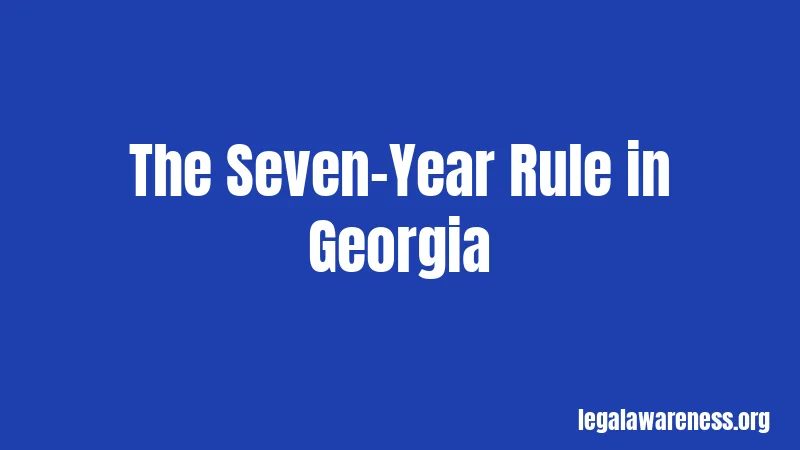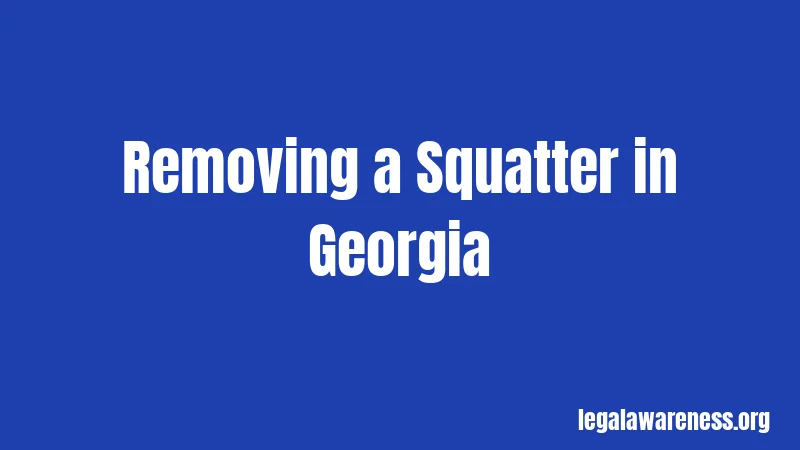Georgia Squatter Laws (2026): What Actually Protects Your Property
Most people think squatting isn’t a big deal. They’re wrong. In Georgia, squatter laws are serious business, and property owners need to understand how they work. If you own land or rent property, this affects you. Let’s break down exactly what you need to know.
Honestly, this is one of those topics that surprises most people. The rules aren’t what you’d expect. But stay with me here—by the end of this article, you’ll understand Georgia’s squatter laws inside and out.
What Is Squatting?

Squatting is when someone moves into a property they don’t own or rent. They just show up and live there. No permission. No lease. No payment. Pretty straightforward, right?
Here’s where it gets interesting. Georgia’s laws actually allow squatters to gain legal ownership under certain conditions. This is called “adverse possession.” Basically, if someone lives on your land long enough without permission, they could actually become the legal owner. So simple to explain, but pretty serious in practice.
How Adverse Possession Works in Georgia
Okay, pause. This part is important. Adverse possession has five specific requirements in Georgia. If someone meets all five, they can legally take ownership of your property. Don’t worry—we’ll break down each one.
The first requirement is “open and notorious” occupation. This means the person has to occupy the land in an obvious way. They’re not hiding. Their presence is visible to anyone paying attention. Think of it like this: they’re living there openly, doing whatever they want on the property, and making no attempt to hide it.
The second requirement is “actual” possession. The squatter must physically occupy and use the land. They can’t just claim it from miles away. They have to be there, actually using the property as an owner would.
The third requirement is “exclusive” possession. This is the tricky one. The person using the land can’t share it with the real owner. The real owner can’t still be using or benefiting from the property. It has to be exclusively the squatter’s space.
The fourth requirement is that the possession must be “hostile” (or “adverse”). Wondering what that means? It basically means without the owner’s permission. You didn’t invite them. You didn’t give permission. They’re there against your wishes. It doesn’t mean they have to be aggressive or mean. Just that the owner never agreed to it.
The fifth and final requirement is time. In Georgia, someone needs to occupy your property for seven years continuously. That’s the magic number. Seven years of meeting all the other requirements, and they could legally own your land.
The Seven-Year Rule in Georgia

Let’s talk about the timeline. You’ve got seven years to stop a squatter before they potentially own your property. Seven years sounds like a long time, but time flies. It really does.
But here’s what most people miss: those seven years have to be continuous and uninterrupted. If the owner takes action against the squatter, the clock resets. If the real owner reclaims the property or wins in court, the adverse possession claim fails. That’s actually good news for property owners.
Not sure what counts as “continuous”? It means the squatter can’t disappear for months or years. They have to stay on the property regularly and actively use it. If they abandon it or leave for an extended period, the requirement breaks.
What Georgia Property Owners Must Do
Stay informed, because this is where things get serious. Leaving a property unattended is risky. The longer your land sits empty and unused, the more vulnerable it is to adverse possession claims.
Here’s what you need to do as a property owner. First, maintain your property regularly. Visit it. Use it. Make improvements. Document everything you do. Take photos and keep records. This proves you’re still the active owner.
Second, post “No Trespassing” signs clearly around the property. These signs help establish that anyone there is trespassing without permission. More importantly, they show the squatter that you don’t approve of their presence. The signs are legal protection for you.
Third, monitor your property carefully. Check on it regularly. Know if someone has moved in. The sooner you notice a squatter, the sooner you can take legal action. Early action is your best defense.
Fourth, never give permission verbally or in writing. If someone asks to camp on your land or stay temporarily, say no. Even casual permission can complicate your legal position. Don’t let anyone occupy your property, even if you think it’s temporary.
Removing a Squatter in Georgia

If you find someone squatting on your property, you can’t just force them out. You have to follow the legal process. Self-help removal could actually get you in trouble legally.
The proper way is through an eviction lawsuit. You’ll file a case in court. The squatter gets a chance to respond. The judge makes a decision. Then, if you win, the sheriff actually removes the person. It takes time, but it’s the right way.
This process is basically like a regular eviction for a tenant who won’t pay rent or leave. You’ll likely need a lawyer to handle it correctly. One mistake in paperwork could delay everything or lose your case.
Penalties and Consequences for Squatters
So what happens to the squatter if you take legal action? The main consequence is removal from the property. They lose any claim to ownership. They have to leave.
If the squatter has caused damage to the property, you might be able to sue for repairs. You could recover money for the cost of fixing what they broke. This is separate from the eviction.
If the squatter was trespassing and caused harm, they could face criminal charges. Trespassing can result in fines up to $1,000 and jail time up to 12 months. Think of it like a traffic ticket but way more serious.
Let me be honest though: most property owners just want the squatter gone. The legal process is more about removing them than punishing them. Your priority is reclaiming your property.
Recent Changes to Georgia Squatter Laws
Here’s where it gets better for property owners. Georgia has been tightening squatter protections in recent years. The state recognizes that adverse possession can be unfair to owners who are temporarily absent.
In 2021, Georgia strengthened its laws around adverse possession claims. Courts now more carefully examine whether possession was truly “hostile” and whether the squatter actually knew the land wasn’t theirs. This helps property owners who can prove they owned and maintained their property.
Wait, it gets even better. If you can show that you paid property taxes on the land during the seven-year period, that helps your case tremendously. Tax records prove you’re the legal owner and you’re actively managing the property. The squatter can’t claim they’re the real owner if you’re paying taxes.
Can a Squatter Become a Legal Tenant?
This is a common question. Can someone squat long enough to become a legal renter? No. That’s not how it works in Georgia. Squatting and tenancy are completely different things.
A tenant has a lease or rental agreement. They pay rent (usually). They have landlord-tenant rights. A squatter has none of that. They’re occupying without permission and without a legal agreement.
However, if you allow someone to stay on your property long enough without a formal agreement, Georgia courts might consider them a legal tenant. Then you’d have to follow formal eviction procedures, not just remove them. This actually makes things harder for you. So never allow anyone to occupy your property without a clear, written agreement.
Special Situations and Exceptions
Rental properties have special rules. If you’re a landlord and a tenant won’t leave after their lease ends, that’s different from adverse possession. It’s a standard eviction. You follow different procedures and faster timelines.
Government-owned land is protected too. You can’t gain adverse possession of public property. The government can claim ownership without paying taxes, and they have extra protections that regular property owners don’t have.
Property disputes between family members sometimes look like squatting but aren’t. If a relative moves in with some implied understanding, the rules get complicated. Courts examine these situations carefully. Honestly, this is where you really need a lawyer to understand your specific situation.
How to Report or Stop a Squatter
If you discover someone squatting on your property, document everything. Take photos of them on your property. Note the dates and times. Keep records of any damage they cause. This evidence supports your legal case later.
Send a formal notice to vacate. Have a lawyer send a certified letter giving them a specific date to leave (usually 30 days). Keep a copy. If they don’t leave, you have documentation of your attempt to resolve it peacefully.
File an eviction lawsuit if they don’t leave by the deadline. Work with a local lawyer who knows Georgia property law. They’ll handle the paperwork and represent you in court. This is the official legal way to remove a squatter.
Contact the local police if the squatter is causing problems or won’t respond to legal notices. They can’t remove them (that requires a court order), but they can document the trespassing and might apply pressure.
Frequently Asked Questions
Can someone really own my property by squatting? Yes, in Georgia they can. If they meet all five requirements and live on your land for seven continuous years, they could gain legal ownership. That’s why staying involved with your property matters.
What if the squatter pays property taxes? Paying taxes during adverse possession actually strengthens their claim. However, you can dispute their right to pay taxes on land you own. If you pay the taxes, it proves you’re the owner.
How do I evict a squatter faster? You can’t really speed up the court process. But posting “No Trespassing” signs and documenting your ownership helps. Working with a lawyer ensures your paperwork is correct and speeds things along.
What if the squatter has kids living with them? The presence of children doesn’t change the legal process. The court still has to follow eviction procedures. However, judges might show some compassion in timing, but the squatter still has to leave eventually.
Can I change the locks to keep them out? No. Doing that yourself could be illegal, even if they’re squatting. You have to use the court system. Self-help removal puts you at legal risk, even when you’re in the right about ownership.
Final Thoughts
Now you know the basics of Georgia squatter laws. The key takeaway? Stay involved with your property. Visit it. Maintain it. Post “No Trespassing” signs. Keep records. Don’t let it sit abandoned for years.
If someone is squatting on your land, don’t panic. Take action immediately. Contact a lawyer. File for eviction. The court process is on your side if you own the property legally.
Understand that adverse possession is real. But you can protect yourself. Stay informed, stay vigilant, and when in doubt, talk to a Georgia property lawyer.
References
Georgia Code Section 34-6-2 (Adverse Possession and Title by Prescription) https://law.justia.com/codes/georgia/title-34/chapter-6/
Georgia Department of Community Affairs https://dca.georgia.gov/
State Bar of Georgia – Lawyer Referral Service https://www.gabar.org/public-services/find-legal-help/
Georgia Legal Services Program https://www.glsp.org/
National Property Owners Association – Georgia Resources https://www.npoa.org/
Georgia Secretary of State – Property Records Information https://sos.ga.gov/
FindLaw – Georgia Adverse Possession Laws https://www.findlaw.com/state/georgia-law/adverse-possession/
